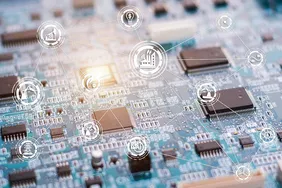The mobility of the future requires the comprehensive evaluation of data. Vehicles communicate with each other and with the infrastructure to bring connected and automated driving safely to the road. In order to further develop this data and the applications associated with it, the GAIA-X 4 KI project started on 1 June 2021. A consortium of 16 partners, including major industrial partners such as Continental and Intel as well as research institutes Fraunhofer ISST and ITWM, is researching with a total budget of 18 million euros how the data required for future mobility can be structured and used. The Technische Hochschule Ingolstadt (THI) is participating through the Institute for Innovative Mobility with a budget of 900,000 euros. The focus is on the functional safety of the electronic systems in the vehicle, without which autonomous driving will not be possible. GAIA-X 4 KI is the first project of the GAIA-X project family funded by the BMWi, which aims to develop and realise a European mobility data cloud.
"We are currently not masters of our data," explains Prof. Dr. Gordon Elger from the Institute for Innovative Mobility at THI. "Europe needs its own data services - among other things, also to be able to meet the requirements in terms of privacy and data protection. We want to make sure that the data the vehicles collect is used according to our social vision." GAIA-X is research into this on a national level, because so far, Elger says, Europe has been completely dependent on the big companies, mainly based in the USA.
GAIA-X 4KI uses artificial intelligence as technical systems become more sophisticated and sees itself as a central and initial building block of the BMWi-driven initiative to build a GAIA-X cloud/edge environment for the mobility domain. "The GAIA-X 4KI project focuses on the development of a data and services ecosystem for training and validating automotive-relevant applications of artificial intelligence, such as those required to record and interpret the environment of a vehicle.
This is shown in the project as an example for use cases from the context of the automotive industry. Specifically, there are two interwoven strands that focus on production optimisation and automated and connected driving (AVF).
As one of the academic partners, the THI contributes to these two use cases. On the one hand, applications for process control are being developed with the help of a virtual twin that optimises complex production steps based on the data available in the GAIA-X ecosystem. On the other hand, THI is contributing to the development of a "monitoring" service within GAIA-X. This service will be provided by data-driven applications. This is enabled by data-driven condition monitoring algorithms that predict sensor malfunctions before they occur.
Furthermore, GAIA-X 4 AI, as the first of several projects, will initially fill the GAIA-X domain "Mobility" with life and fit seamlessly into the GAIA-X 4 Future Mobility project family.
In summary, the central contribution of GAIA-X 4 AI lies in the first-time linking of the topics GAIA-X, manufacturing processes and innovative vehicle functions, as well as research into cloud systems and the handling of the associated data and services.
The project was presented at the BMWi stand at the International Motor Show (IAA), which takes place from 6 to 12 September in Munich.


![[Translate to English:] Logo Akkreditierungsrat: Systemakkreditiert](/fileadmin/_processed_/2/8/csm_AR-Siegel_Systemakkreditierung_bc4ea3377d.webp)








![[Translate to English:] Logo IHK Ausbildungsbetrieb 2023](/fileadmin/_processed_/6/0/csm_IHK_Ausbildungsbetrieb_digital_2023_6850f47537.webp)


